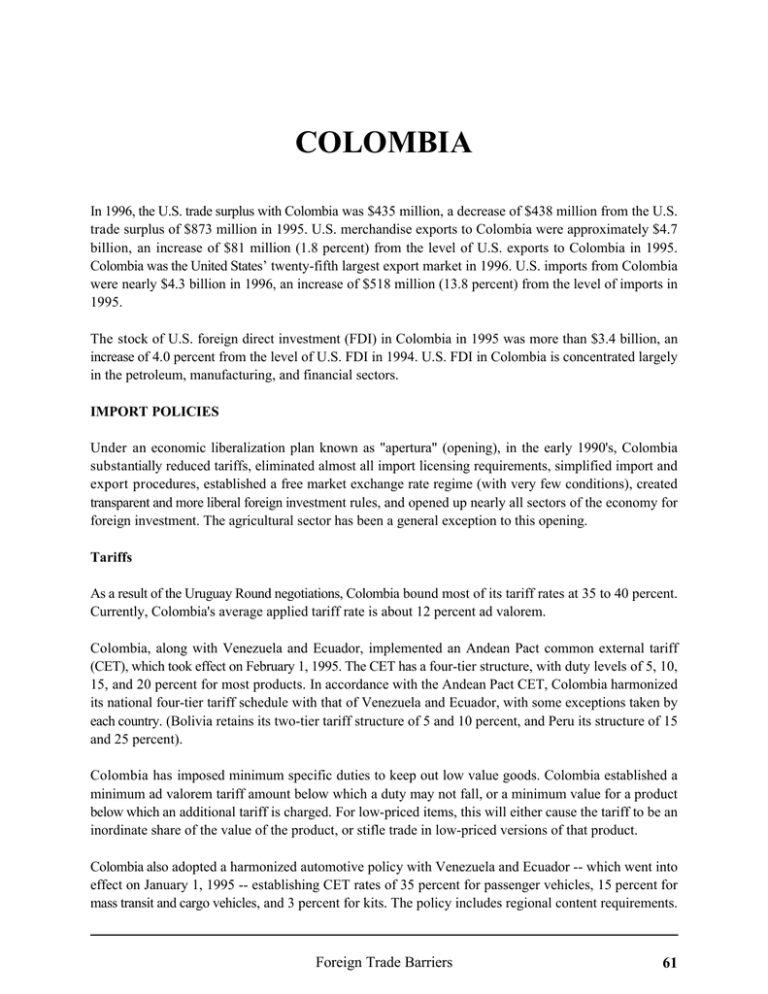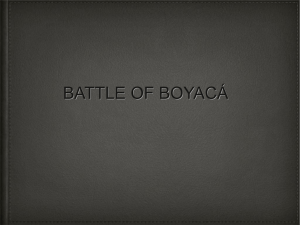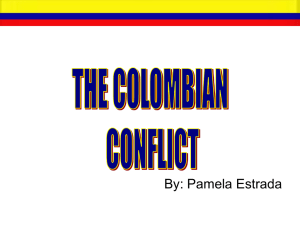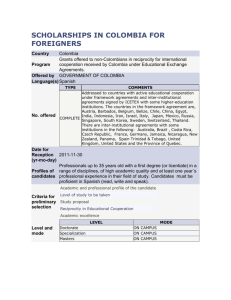COLOMBIA
advertisement

COLOMBIA In 1996, the U.S. trade surplus with Colombia was $435 million, a decrease of $438 million from the U.S. trade surplus of $873 million in 1995. U.S. merchandise exports to Colombia were approximately $4.7 billion, an increase of $81 million (1.8 percent) from the level of U.S. exports to Colombia in 1995. Colombia was the United States’ twenty-fifth largest export market in 1996. U.S. imports from Colombia were nearly $4.3 billion in 1996, an increase of $518 million (13.8 percent) from the level of imports in 1995. The stock of U.S. foreign direct investment (FDI) in Colombia in 1995 was more than $3.4 billion, an increase of 4.0 percent from the level of U.S. FDI in 1994. U.S. FDI in Colombia is concentrated largely in the petroleum, manufacturing, and financial sectors. IMPORT POLICIES Under an economic liberalization plan known as "apertura" (opening), in the early 1990's, Colombia substantially reduced tariffs, eliminated almost all import licensing requirements, simplified import and export procedures, established a free market exchange rate regime (with very few conditions), created transparent and more liberal foreign investment rules, and opened up nearly all sectors of the economy for foreign investment. The agricultural sector has been a general exception to this opening. Tariffs As a result of the Uruguay Round negotiations, Colombia bound most of its tariff rates at 35 to 40 percent. Currently, Colombia's average applied tariff rate is about 12 percent ad valorem. Colombia, along with Venezuela and Ecuador, implemented an Andean Pact common external tariff (CET), which took effect on February 1, 1995. The CET has a four-tier structure, with duty levels of 5, 10, 15, and 20 percent for most products. In accordance with the Andean Pact CET, Colombia harmonized its national four-tier tariff schedule with that of Venezuela and Ecuador, with some exceptions taken by each country. (Bolivia retains its two-tier tariff structure of 5 and 10 percent, and Peru its structure of 15 and 25 percent). Colombia has imposed minimum specific duties to keep out low value goods. Colombia established a minimum ad valorem tariff amount below which a duty may not fall, or a minimum value for a product below which an additional tariff is charged. For low-priced items, this will either cause the tariff to be an inordinate share of the value of the product, or stifle trade in low-priced versions of that product. Colombia also adopted a harmonized automotive policy with Venezuela and Ecuador -- which went into effect on January 1, 1995 -- establishing CET rates of 35 percent for passenger vehicles, 15 percent for mass transit and cargo vehicles, and 3 percent for kits. The policy includes regional content requirements. Foreign Trade Barriers 61 Colombia In recent years Colombia has negotiated trade arrangements with other Latin American and Caribbean countries. Colombia has a comprehensive free trade agreement with Mexico and Venezuela, known as the G-3 Agreement, which took effect on January 1, 1995, under which most tariffs are to be reduced to zero by the year 2007. Colombia also has a partial free trade agreement with Chile. All of Colombia's bilateral and regional trade agreements are based on Latin American Integration Association (ALADI) regulations and procedures. Other agreements, such as those negotiated with Cuba, Panama, Central America, and CARICOM, have either been ineffective or have not been fully implemented. Colombia, like the other members of the Andean Pact, is in the initial stages of negotiating a free trade arrangement with the countries of MERCOSUR. Non-Tariff Measures Most products are subject to a 16 percent value-added tax (automobiles are subject to higher rates ranging from 20 to 60 percent). This tax applies to domestically produced goods as well as imports. Colombia requires import licenses on less than two percent of products, primarily weapons and other products related to defense as well as "precursor" chemicals that may be used in refining cocaine. The majority of used goods -- used cars, tires, and clothing -- are prohibited from import, and those that are allowed, such as machinery, are subject to licensing. The agriculture sector in Colombia remains protected. Since the promulgation of Decree 2439 in November 1994, the Ministry of Agriculture has been required to approve import licenses for many agricultural items, such as wheat, poultry meat, malting barley, corn, cotton, rice, sorghum, wheat flour, oilseeds and their products, soybeans, soybean meal, and soybean oil. Private importers are more likely to have their import licenses approved if they also buy domestically-produced wheat, sorghum, palm oil, or malting barley. This import licensing regime appears to be discretionary and thus not consistent with Colombia's obligations under the WTO Agreement on Agriculture. If the import licensing requirement for the products indicated above were eliminated, it is estimated that U.S. annual exports would increase by $10 million. Thirteen basic agricultural commodities (powdered milk, wheat, malting barley, yellow and white corn, crude palm and soybean oils, white rice, soybeans, white and raw sugars, chicken pieces, and pork meat) and an additional 120 commodities that are considered substitutes or related products are subject to a variable import tariff "price band" system. Imported wheat is also subject to minimum import prices. There are at this time no reliable figures showing how much U.S. exports would increase if the price band system were eliminated. Since July 1993, the Colombian Foreign Trade Institute (INCOMEX) has required an approval prior to the importation of chicken parts. Under this system, the Government of Colombia has approved import licenses only when it has determined such imports will not adversely affect Colombian chicken producers. Since 1994, import licenses to import U.S. chicken parts have been regularly denied. If the import licensing requirement for chicken parts were eliminated, it is estimated that U.S. annual exports would increase by approximately $10 million. 62 Foreign Trade Barriers Colombia Valuation of imported merchandise, previously the responsibility of the Customs Service, can now ostensibly be done by importers who self-value, assess, and pay duties and other taxes at commercial banks. Customs clearance processes in many instances can be performed fairly rapidly. However, Colombia's pre-shipment inspection of imported equipment must be performed by an independent testing agency which, according to U.S. industry, results in unnecessary delays. Through a series of resolutions dating back to November 1994, the Colombian Government has created a pre-shipment inspection (PSI) mechanism using private PSI companies. Upon acceding to the WTO Agreement on Pre-Shipment Inspection, Colombia took measures to allow PSI companies to perform certain direct functions under the control of the National Tax and Customs Directorate (DIAN). As of February 1, 1996, PSI companies began mandatory preclearance of all goods defined as "sensitive" by the Colombian Government. STANDARDS, TESTING, LABELING, AND CERTIFICATION INCOMEX mandates compliance with specific technical standards for a variety of products. The particular specifications are established by the Colombian Institute of Standards (ICONTEC). Under Decree 300 of 1995, a certificate of conformity with Colombian standards is required prior to the importation of any good regulated by a standard. Inconsistencies in the application and enforcement of standards sometimes lead to problems for U.S. exporters. Several products require testing to verify conformity with ICONTEC standards. The shortage of officially recognized laboratories and a lack of transparency has affected enforcement of existing regulations regarding quality conformity. ICONTEC is strengthening a national system on quality and standards by the creation of a national network of certified metrology laboratories. Colombian officials have visited similar sites in the United States for study. The Center for Quality Control and Metrology, due to open in 1997, will be key in assuring quality compliance to national and international standards of any product (whether imported or produced locally) entering the Colombian market,. Colombia’s tax law, Law 223, which took effect on January 1, 1996, establishes that all distilled spirits are subject to a value-added tax of 35 percent. However, the law makes an exception for whiskeys that are aged for 12 or more years, which are subject to a 20 percent value-added tax. Bourbon and Tennessee Whiskey -- both distinctive products of the United States -- are typically aged from four to eight years and, as a consequence, face a higher tax rate than most competing imported whiskeys which are aged longer. This distinction between whiskeys creates a competitive disadvantage for Bourbon and Tennessee Whiskey. The United States has pointed out this inconsistency in the Colombian tax law but, to date, the Government of Colombia has not revised its law. According to U.S. industry, Colombian requirements for phytosanitary registrations to bring new products into the market take an excessively long time, six to eight months, to fulfill. In 1996, Colombian authorities began requiring that all fresh fruit and vegetables originating from California and Florida be fumigated at the port of entry with methyl bromide. By October 1996, after Colombian officials visited the states in question, the requirement was repealed. Foreign Trade Barriers 63 Colombia GOVERNMENT PROCUREMENT An October 1993 government procurement and contracting law, Law 80, provides equal treatment to foreign companies on a reciprocal basis and eliminates the 20 percent surcharge previously added to foreign bids. In implementing Law 80, the Government of Colombia instituted a burdensome requirement that companies without local headquarters must certify reciprocity in government procurement in the home country. Law 80 does not apply to contracts for the exploration and exploitation of renewable or non-renewable natural resources, their commercialization, and those activities performed by state companies involved in these sectors; nor does it apply to contracts for telecommunications, radio, television, and long distance telephone services. These contracts are governed by other laws. Colombia is not a signatory to the WTO Agreement on Government Procurement. U.S. providers of telecommunications services have encountered difficulties in bidding on contracts. The bidding process suffers from a lack of transparency and other irregularities. One U.S. company lost bids on contracts worth over $100 million amid allegations of illicit payments made by competitors. Other U.S. companies have found themselves unable to enter the bidding process owing to their unwillingness to offer financial incentives. Another U.S. company was judged the best contestant technically, legally, and financially by two different evaluating boards, but the final decision was delayed repeatedly without explanation. And in another case, a $93 million government contract was initially awarded to a foreign competitor, but then the entire bidding process was canceled amid allegations of improper activities and bribes. A U.S. company lost years of effort and millions of dollars invested in the preparation of its bid, which was judged by an independent commission to be the best submitted from a third country. EXPORT SUBSIDIES As a result of "apertura" and commitments made by the Government of Colombia to the U.S. Government in the context of acceding to the GATT subsidies code, Colombia agreed to phase out any export subsidies inconsistent with that code. This process will continue under the WTO Agreement on Subsidies and Countervailing Measures. Colombia's tax rebate certificate program (CERT) contains a subsidy component; the Government of Colombia has committed to eliminating the subsidy and creating an equitable drawback system, but has not yet done so. Colombia also has notified the WTO of its "special machinery import-export system" and "free zones" as constituting export subsidies. LACK OF INTELLECTUAL PROPERTY PROTECTION Despite significant improvement in 1993 and 1994 in the area of intellectual property rights (IPR), Colombia does not yet provide adequate and effective protection. As a result of its laws and practices -especially its inadequate IPR enforcement - - Colombia has been on the "Watch List" under the Special 301 provision of the 1988 Trade Act every year since 1991. The United States continues to discuss IPR issues with Colombia and remains interested in negotiating a bilateral agreement on intellectual property protection. Colombia has ratified, but not yet fully implemented, the provisions of the WTO Agreement on Trade-Related Aspects of Intellectual Property Rights (TRIPS). 64 Foreign Trade Barriers Colombia Patents and Trademarks Two Andean Pact decisions on the protection of patents and trademarks and of plant varieties have been in effect in Colombia since January 1, 1994. The decisions are comprehensive and offer a significant improvement over previous standards of protection of intellectual property in the Andean Pact countries. For example, they provide a 20-year term of protection for patents and reversal of the burden of proof in cases of alleged process patent infringement. The provisions of the decisions covering protection of trade secrets and new plant varieties are generally consistent with world-class standards for protecting intellectual property rights. However, the decisions still contain deficiencies, including overly broad compulsory licensing provisions, working requirements, restrictions on biotechnology inventions, denial of pharmaceutical patent protection for patented products listed on the World Health Organization's Model List of Essential Drugs, the lack of transitional (“pipeline”) protection, and the lack of protection against parallel imports. In June 1996, Colombia ratified the Paris Convention for the Protection of Industrial Property, which went into effect in September 1996. Colombia's trademark protection requires registration and use of a trademark in Colombia. Trademark registrations have a ten-year duration and may be renewed for successive ten-year periods. Priority rights are granted to the first application for trademark in another Andean Pact country or in any country which grants reciprocal rights. Colombia is a member of the Inter-American Convention for Trademark and Commercial Protection. Enforcement in the trademark area remains a weak. The Colombian Government has made progress administering patent and trademark regulations. The agency in charge of patents and trademarks -- the Superintendency of Industry and Commerce -- has cleared up some of its trademark backlog. However, some 27,000 cases remain pending. The Andean Pact decision on patent and trademark protection also provides for protection of industrial secrets. Protected property includes that which is secret (not generally known or easily accessible to those who usually handle such information) and has an effective commercial value or a potential commercial value as a secret. The decision requires that the person wishing to maintain the secrecy of a product take reasonable steps to ensure that secrecy. According to U.S. industry, Colombia maintains a policy of promoting unbranded pharmaceuticals at the expense of the brands typically produced by multinational companies. Law 100 establishes that the Colombian people will be covered by either social security or health promoting entities and that pharmaceutical products will be supplied based on a list of only 307 generic substances, thereby threatening to bring about the disappearance of the brand name pharmaceutical market in Colombia. Copyrights An Andean Pact decision on the protection of copyrights has been in effect in Colombia since January 1, 1994. Colombia also has a modern copyright law, Law 44 of 1993. The law extends protection for computer software to 50 years, but does not classify it as a literary work. Law 44 and Colombia’s Civil Code include some provisions for IPR enforcement which have been used to combat infringement and Foreign Trade Barriers 65 Colombia protect rights. Colombia belongs to both the Berne and the Universal Copyright Conventions. This decision provides a generally Berne-consistent system. Semiconductor layout designs are not protected under Colombian law. Colombia's 1993 copyright law significantly increased penalties for copyright infringement, specifically empowering the attorney general's office to combat piracy. However, U.S. industry estimates that video cassette piracy represents over 75 percent of the video market, sound recording piracy has soared to 66 percent of the market, and business software piracy has dropped slightly to 67 percent of the market. Industry estimates total revenue lost to copyright piracy at $131 million in 1996. SERVICES BARRIERS Colombia maintains barriers in a number of service areas, including audiovisual, franchising, data processing, and professional services. In some industries, percentage limits are placed on foreign equity participation. In addition, a minimum of 50 percent of any television commercial for public broadcast network programming must be produced locally. Colombia denies market access to foreign marine insurers. Colombia requires a commercial presence to sell all insurance except international travel or reinsurance. Colombia permits 100 percent foreign ownership of insurance subsidiaries, but the establishment of branch offices of foreign insurance companies is not allowed. Foreign law firms are not permitted a commercial presence in Colombia unless the firm is headed by a Colombian attorney. Colombia also restricts the movement of personnel in several professional areas, such as architecture, engineering, law, and construction. Firms with more than ten employees can have no more than 20 percent of specialists and 10 percent of unskilled laborers who are foreign nationals. In 1991 Colombia promulgated Resolution 51, which permits 100 percent foreign ownership in financial services, although the use of foreign personnel in the financial services sector remains limited to administrators, legal representatives, and technicians. For a full discussion of treatment of U.S. banking and securities firms, see the Department of Treasury's 1994 National Treatment Study. Cargo reserve requirements have been eliminated. However, the Ministry of Foreign Trade reserves the right to impose restrictions on foreign vessels of nations which impose reserve requirements on Colombian vessels. Basic Telecommunications Services In the recently concluded WTO negotiations on basic telecommunications services, Colombia made commitments on some basic telecom services. It adopted the reference paper on regulatory commitments. Colombia limited foreign ownership for telecom services to 70 percent, and made market access and national treatment for cellular, PCS, long-distance, and international services subject to an economic needs test. 66 Foreign Trade Barriers Colombia INVESTMENT BARRIERS Investment screening has been largely eliminated, and the mechanisms that still exist are generally routine and non-discriminatory. Legislation grants national treatment to foreign direct investors and permits complete foreign ownership in virtually all sectors of the Colombian economy. However, since 1994, in an effort to curb money laundering, the Colombian Government has prohibited foreign direct investors from obtaining ownership in real estate not connected with other investment activities. Local content requirements exist in the automotive assembly sector as outlined in Decree 440 of March 1995, covering Colombia, Venezuela, and Ecuador. Beginning January 1, 1997, a minimum of 32-33 percent of local content is required for passenger vehicles carrying up to 16 persons, and cargo vehicles carrying up to 10,000 lbs., to meet national or regional origin standards. For all other vehicles, the requirement is 17-18 percent. Penalties will be established to enforce compliance with these percentages. All foreign investment in petroleum exploration and development in Colombia must be carried out by an association contract between the foreign investor and ECOPETROL, the state oil company. The terms of the association contract underwent changes in 1994 and 1995 that represent an improvement over the terms in effect since 1989, but are still not as attractive as the original terms introduced in 1976. The 1995 changes opened previously reserved areas to foreign development and allowed for extensions of the length of association contracts during the last five years of the contract. These changes are not expected to make petroleum investment significantly more economically viable. Although the Colombian Government opened small operating fields of less than 40 million barrels to foreign investment in 1995, it has not taken steps to make them more profitable to investors. The Government of Colombia has been imposing a "war" tax of approximately one dollar per barrel on foreign oil companies, which acts as an economic disincentive. According to a tax reform law adopted in December 1995, the war tax is being phased out on a two-tier schedule. For certain fields the tax requirement expires December 31, 1997, and for others it is gradually reduced until its elimination on December 31, 2000. The "war" tax is not imposed on new fields discovered after January 1, 1995. OTHER BARRIERS For three years, Colombia has maintained a policy of price controls for medicines which allows price increases up to a rate several points below the expected level of overall inflation. Law 100, already in force, has dramatically affected the private brand name market for pharmaceuticals. While technically Colombians are given the option to purchase products bearing trademarks or brand names, the law has interfered with the market by creating a structure that unfairly or unnecessarily favors consumption of “generic” drugs at the expense of those bearing trademarks. Export Licenses On January 9, 1995, USTR initiated a Section 301 investigation of Colombia's implementation of the Banana Framework Agreement (BFA) with the EU. On January 10, 1996, USTR determined that Colombia's policies, acts and practices were unreasonable and discriminatory and a burden or restriction Foreign Trade Barriers 67 Colombia on U.S. commerce. Taking into account the positive steps Colombia had taken in revising its internal banana regime and its willingness to cooperate with the United States in reforming the EU regime, USTR decided that the appropriate action was to implement a process aimed at addressing the outstanding issues, while stressing that additional action may still be taken. The United States and Colombia signed a Memorandum of Understanding (MOU) on that process. During 1996, the dispute over the EU banana import regime, including the EU’s implementation of the BFA, was submitted to a dispute settlement panel of the WTO by the United States and four other countries. USTR will continue to monitor Colombia’s adherence to the MOU, particularly in light of ongoing WTO proceedings against the EU regime. Taxes According to U.S. industry, Colombia applies a tax of 24 percent on income from sales of computer software which, when combined with a remittance tax of nearly 10 percent on royalties, yields an aggregate tax of greater than 30 percent on foreign licensors. Television Local Content Quotas As part of the de-monopolization of Colombia's government-owned television network, Colombia passed the Television Broadcast Law, Law 182/95, effective January 1995, which increases protection for all copyrighted programming by regulating satellite dishes and permits private television broadcasters to compete with the government-owned broadcaster. It permits foreign direct investment in the Colombian motion picture industry, but limits foreign investment to 15 percent of the total capital of local television programming production companies. The law increases restrictions on foreign content in broadcasting, including a complicated, burdensome system of subquotas for different hours of the day. The Colombian law requires broadcasters to transmit 70 percent locally-produced programming during prime time and a range of zero to 40 percent during other times on national television, and 50 percent locally-produced programming on regional channels and local stations. Foreign talent may be used in locally-produced programming, but limits are set by the Colombian quasi-independent national television commission. Law 182/95 also includes burdensome restrictions on foreign investment, mandating reciprocity requirements and requirements that foreign investors be engaged actively in television operations in their country of origin. Foreign investment also must involve an implicit transfer of technology. The Television Commission has the authority to reduce these restrictions, but has not taken action in this area. 68 Foreign Trade Barriers




